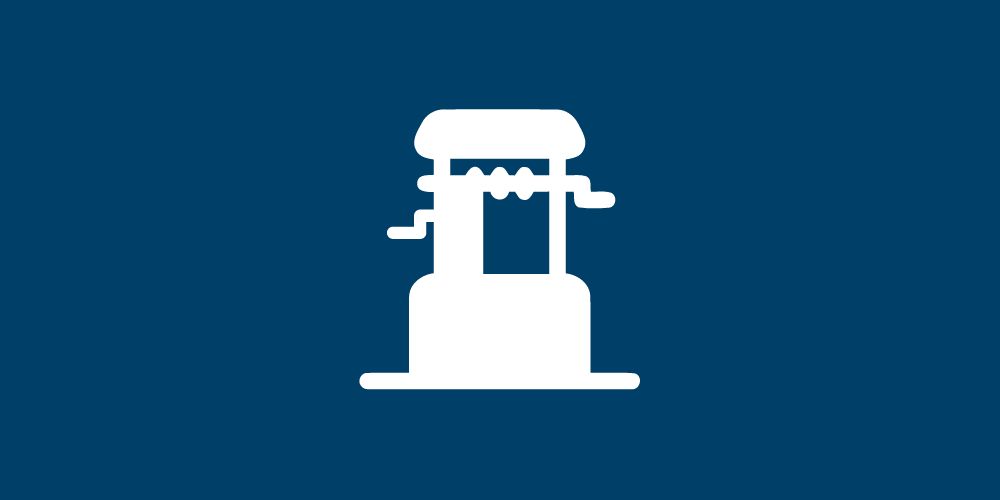Water is a necessary part of life, and most homeowners take their access to clean water for granted. However, if you live in an area with a well, you know that one day the water can just stop running. While it’s easy to panic when this happens, it’s important to stay calm and figure out what the problem might be.

Your well water may stop running for a variety of reasons. The most common cause is a lack of water in the well, but there are other potential causes as well.
In this blog post, we’ll explore some common reasons why your well water might stop running. We’ll also provide tips on how to fix each issue. So, if you’re experiencing problems with your well water, keep reading!
How to Fix Your Well Water When it Stops Running
If your well water stops running, there are a few steps you can take to fix the problem. First, check the obvious: is the power turned on? If so, try resetting the pump. If this doesn’t work, turn off the power and call a local plumber.
If you don’t find any problems with your pump or power, there are a few other possible causes for well water to stop running. For example, the well may be flooded. This happens when too much groundwater enters the well; it can overload the motor and cause it to shut down. At this point, you’ll need to shut off the power and pump out the water
You may also experience a well blockage that causes water to stop running. This is most often caused by too much dirt in your well, so be sure to clean it as soon as possible. In some instances, this problem can be resolved by running a strong cable down into the well.
In addition, you might find that the intake pipe has been knocked loose from its normal position. If this is the case, simply reconnect it and then check if your well water starts running again.
If none of these fixes seem to solve your problem – or they only resolve the issue briefly – you likely have an issue with either your pressure tank. However, we recommend calling a plumber at this point, as well.
So, now that we’ve gone over some reasons why your well water may stop running and provided tips for resolving each issue, you should be able to fix the problem yourself – and prevent it from occurring again.
What causes low water pressure in a well?
Water pressure is an important aspect of every well. A reduction in water pressure can mean a decrease in the overall function of your well. There are several factors that can lead to low water pressure in a well, and it’s important to understand these causes so you can take corrective action.
There’s a pressure gauge/valve/relay system, generally a short pipe stem from the main water line near the pressure tank. If the pipe or valve is clogged or otherwise fails, the relay does not switch on in time, allowing pressure to fall very low (even to zero) before the pump kicks in again, raising the pressure.
A more complex but similar situation can occur if an air bubble is present in the pressure tank. A clogged pipe may work by itself, but bubbles are pressing on the plunger end of the diaphragm, preventing it from working
If all of these can be ruled out or repaired, there may also be a main valve (ball valve) that is not entirely shut off, allowing some water to flow out of the well into the supply piping. You may need to turn off the main feed into the house if this occurs.
What does it mean for your well water to run constant?
When your well water runs constant, this means there’s enough pressure in the tank so that it continually produces water at a steady rate; you won’t experience drops or surges in pressure. Because of this, having running water constantly doesn’t cause any issues – but it can also indicate a few different problems with your system.
The most common issue is a lack of a sufficient volume of water in your pressure tank. The simplest solution is to add an expansion tank to the system. This allows the water in your pressure tank or bladder tank to expand, preventing damage due to changes in temperature and also ensuring that you have ample water in storage
If you’re experiencing a sudden loss in water pressure when using certain fixtures, however, this can indicate that there ‘s too much water in the tank. While this is generally not a problem, it can be dangerous
Another issue that may cause your well to run constantly is if the intake pipe has been knocked loose or mispositioned. If you’ve checked for blockages and other problems with the system, check whether the intake line is straightened out properly. If none of these solutions seem to apply, you may also have an issue with the pump.
How to know if a well is running out of water?
A homeowner’s worst nightmare is a well running out of water. If this happens, you will need to find another water source quickly. Fortunately, there are several ways to tell if you are well is running low on water.
If your well is running low on water, you’ll likely see a steady decline in water pressure. If this happens, it’s important to act quickly. Your goal should be to find another source of water as soon as possible
Another indicator that your system is running out of water is if the static level has fallen below the intake line. You should be able to see this if you have a clear plastic tube leading from the intake line to the surface. If you can’t see water passing through it, chances are good that your well has fallen below the level of surrounding groundwater
Final Thoughts
Wells do not require a lot of maintenance, and many homeowners who rely on their wells never do anything about them other than checking the pressure gauge.
However, understanding how your well works can help you to identify problems and offer solutions before they cause extensive damage or inconvenience.
Water pressure is an important aspect of every well. A reduction in water pressure can mean a decrease in the overall function of your well. Understanding the cause of this problem and how to solve it can help you keep your well functioning for years to come.

